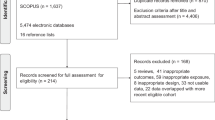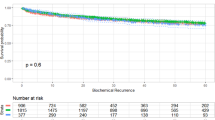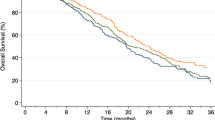Abstract
Background:
We examined the relationship between weight change in the year before radical prostatectomy (RP) and biochemical recurrence (BCR) and adverse pathology.
Methods:
We abstracted data from 359 men undergoing RP in the SEARCH (Shared Equal Access Regional Cancer Hospital) database between 2001–2007. Logistic regression and Cox proportional hazards models were used to test the association between weight change in the year before surgery and adverse pathology and BCR, respectively.
Results:
In all, 152 (42%) men gained weight, 193 (54%) lost weight and 14 (4%) had the same weight. Among weight gainers, median gain was 2.4 kg and among weight losers, median loss was 2.7 kg. As a continuous variable, weight change was not associated with adverse pathology or BCR (all P>0.05). In secondary analysis, on multivariate analysis, men gaining ⩾2.5 kg were at higher BCR risk (hazards ratio=1.65, 95% confidence interval (CI): 1.03–2.64, P=0.04) while weight loss ⩾2.5 kg was not associated with BCR (hazards ratio=0.83, 95% CI: 0.54–1.29, P=0.41).
Conclusions:
As a continuous variable, weight change was not associated with outcome. In secondary hypothesis-generating analyses, weight gain ⩾2.5 kg in the year before surgery, regardless of final body mass index, was associated with increased BCR following RP. If validated, these data suggest weight gain ⩾2.5 kg may promote prostate cancer progression.
This is a preview of subscription content, access via your institution
Access options
Subscribe to this journal
Receive 4 print issues and online access
$259.00 per year
only $64.75 per issue
Buy this article
- Purchase on Springer Link
- Instant access to full article PDF
Prices may be subject to local taxes which are calculated during checkout


Similar content being viewed by others
References
Calle EE, Rodriguez C, Walker-Thurmond K, Thun MJ . Overweight, obesity, and mortality from cancer in a prospectively studied cohort of U.S. adults. N Engl J Med 2003; 348: 1625–1638.
Gong Z, Agalliu I, Lin DW, Stanford JL, Kristal AR . Obesity is associated with increased risks of prostate cancer metastasis and death after initial cancer diagnosis in middle-aged men. Cancer 2007; 109: 1192–1202.
Strom SS, Wang X, Pettaway CA, Logothetis CJ, Yamamura Y, Do KA et al. Obesity, weight gain, and risk of biochemical failure among prostate cancer patients following prostatectomy. Clin Cancer Res 2005; 11 (19 Part 1): 6889–6894.
Wright ME, Chang SC, Schatzkin A, Albanes D, Kipnis V, Mouw T et al. Prospective study of adiposity and weight change in relation to prostate cancer incidence and mortality. Cancer 2007; 109: 675–684.
Amling CL, Riffenburgh RH, Sun L, Moul JW, Lance RS, Kusuda L et al. Pathologic variables and recurrence rates as related to obesity and race in men with prostate cancer undergoing radical prostatectomy. J Clin Oncol 2004; 22: 439–445.
Bassett WW, Cooperberg MR, Sadetsky N, Silva S, DuChane J, Pasta DJ et al. Impact of obesity on prostate cancer recurrence after radical prostatectomy: data from CaPSURE. Urology 2005; 66: 1060–1065.
Freedland SJ, Aronson WJ, Kane CJ, Presti Jr JC, Amling CL, Elashoff D et al. Impact of obesity on biochemical control after radical prostatectomy for clinically localized prostate cancer: a report by the Shared Equal Access Regional Cancer Hospital database study group. J Clin Oncol 2004; 22: 446–453.
Mallah KN, DiBlasio CJ, Rhee AC, Scardino PT, Kattan MW . Body mass index is weakly associated with, and not a helpful predictor of, disease progression in men with clinically localized prostate carcinoma treated with radical prostatectomy. Cancer 2005; 103: 2030–2034.
Freedland SJ, Banez LL, Sun LL, Fitzsimons NJ, Moul JW . Obese men have higher-grade and larger tumors: an analysis of the duke prostate center database. Prostate Cancer Prostatic Dis 2009; 12: 259–263.
Rodriguez C, Freedland SJ, Deka A, Jacobs EJ, McCullough ML, Patel AV et al. Body mass index, weight change, and risk of prostate cancer in the Cancer Prevention Study II Nutrition Cohort. Cancer Epidemiol Biomarkers Prev 2007; 16: 63–69.
Bonorden MJ, Rogozina OP, Kluczny CM, Grossmann ME, Grande JP, Lokshin A et al. Cross-sectional analysis of intermittent versus chronic caloric restriction in the TRAMP mouse. Prostate 2009; 69: 317–326.
Mukherjee P, Sotnikov AV, Mangian HJ, Zhou JR, Visek WJ, Clinton SK . Energy intake and prostate tumor growth, angiogenesis, and vascular endothelial growth factor expression. J Natl Cancer Inst 1999; 91: 512–523.
Joshu CE, Mondul AM, Menke A, Meinhold C, Han M, Humphreys EB et al. Weight gain is associated with an increased risk of prostate cancer recurrence after prostatectomy in the PSA era. Cancer Prev Res (Phila) 2011; 4: 544–551.
Banez LL, Loftis RM, Freedland SJ, Presti Jr JC, Aronson WJ, Amling CL et al. The influence of hepatic function on prostate cancer outcomes after radical prostatectomy. Prostate Cancer Prostatic Dis 2010; 13: 173–177.
Nam SY, Lee EJ, Kim KR, Cha BS, Song YD, Lim SK et al. Effect of obesity on total and free insulin-like growth factor (IGF)-1, and their relationship to IGF-binding protein (BP)-1, IGFBP-2, IGFBP-3, insulin, and growth hormone. Int J Obes Relat Metab Disord 1997; 21: 355–359.
Frystyk J, Vestbo E, Skjaerbaek C, Mogensen CE, Orskov H . Free insulin-like growth factors in human obesity. Metabolism 1995; 44 (10 Suppl 4): 37–44.
Guertin DA, Sabatini DM . An expanding role for mTOR in cancer. Trends Mol Med 2005; 11: 353–361.
Mavropoulos JC, Buschemeyer 3rd WC, Tewari AK, Rokhfeld D, Pollak M, Zhao Y et al. The effects of varying dietary carbohydrate and fat content on survival in a murine LNCaP prostate cancer xenograft model. Cancer Prev Res (Phila) 2009; 2: 557–565.
Freedland SJ, Mavropoulos J, Wang A, Darshan M, Demark-Wahnefried W, Aronson WJ et al. Carbohydrate restriction, prostate cancer growth, and the insulin-like growth factor axis. Prostate 2008; 68: 11–19.
Venkateswaran V, Haddad AQ, Fleshner NE, Fan R, Sugar LM, Nam R et al. Association of diet-induced hyperinsulinemia with accelerated growth of prostate cancer (LNCaP) xenografts. J Natl Cancer Inst 2007; 99: 1793–1800.
Hammarsten J, Damber JE, Karlsson M, Knutson T, Ljunggren O, Ohlsson C et al. Insulin and free oestradiol are independent risk factors for benign prostatic hyperplasia. Prostate Cancer Prostatic Dis 2009; 12: 160–165.
Ma J, Li H, Giovannucci E, Mucci L, Qiu W, Nguyen PL et al. Prediagnostic body-mass index, plasma C-peptide concentration, and prostate cancer-specific mortality in men with prostate cancer: a long-term survival analysis. Lancet Oncol 2008; 9: 1039–1047.
Freedland SJ, Humphreys EB, Mangold LA, Eisenberger M, Partin AW . Time to prostate specific antigen recurrence after radical prostatectomy and risk of prostate cancer specific mortality. J Urol 2006; 176 (4 Part 1): 1404–1408.
Antonelli J, Freedland SJ, Jones LW . Exercise therapy across the prostate cancer continuum. Prostate Cancer Prostatic Dis 2009; 12: 110–115.
Author information
Authors and Affiliations
Consortia
Corresponding author
Ethics declarations
Competing interests
The authors declare no conflict of interest.
Rights and permissions
About this article
Cite this article
Whitley, B., Moreira, D., Thomas, JA. et al. Preoperative weight change and risk of adverse outcome following radical prostatectomy: results from the Shared Equal Access Regional Cancer Hospital database. Prostate Cancer Prostatic Dis 14, 361–366 (2011). https://doi.org/10.1038/pcan.2011.42
Received:
Revised:
Accepted:
Published:
Issue Date:
DOI: https://doi.org/10.1038/pcan.2011.42
Keywords
This article is cited by
-
Obesity and biochemical recurrence in clinically localised prostate cancer: a systematic review and meta-analysis of 86,490 patients
Prostate Cancer and Prostatic Diseases (2022)
-
White adipose tissue-derived factors and prostate cancer progression: mechanisms and targets for interventions
Cancer and Metastasis Reviews (2022)
-
Predicting bone scan positivity after biochemical recurrence following radical prostatectomy in both hormone-naive men and patients receiving androgen-deprivation therapy: results from the SEARCH database
Prostate Cancer and Prostatic Diseases (2014)
-
Body mass index and weight change in men with prostate cancer: progression and mortality
Cancer Causes & Control (2014)
-
Fish oil slows prostate cancer xenograft growth relative to other dietary fats and is associated with decreased mitochondrial and insulin pathway gene expression
Prostate Cancer and Prostatic Diseases (2013)



